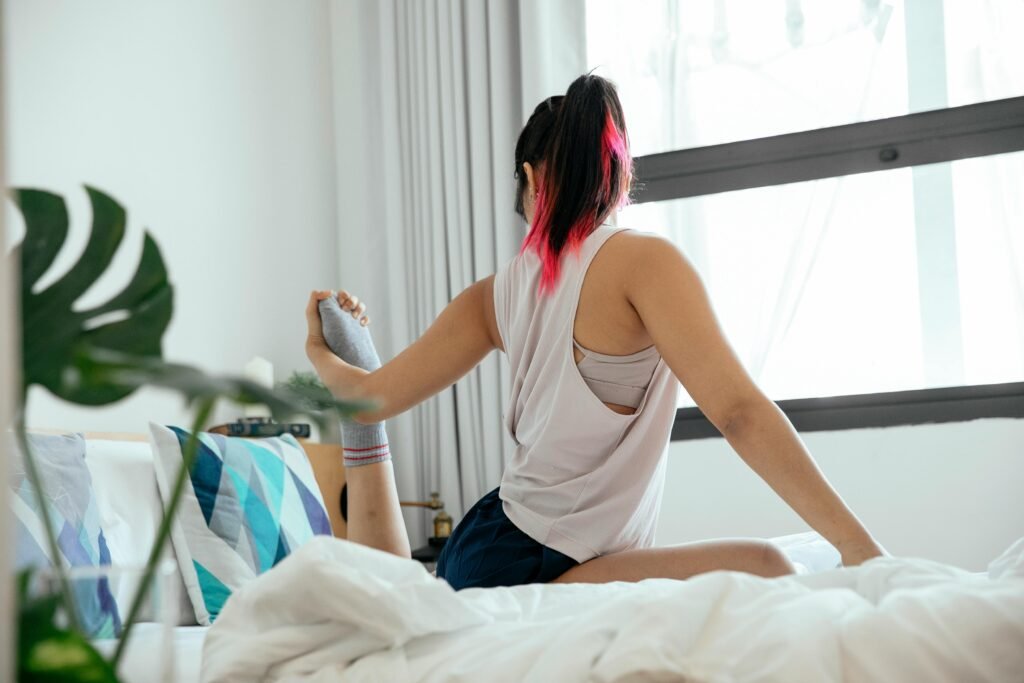Picture this: It’s 3 AM, and you’re staring at the ceiling, wondering why your brain decided this was the perfect time to replay every awkward conversation from fifth grade. Sound familiar? You’re not alone in this midnight struggle. Millions of Americans toss and turn nightly, desperately seeking that elusive restful sleep that seems to come so easily to others.
Here’s the thing—improving sleep quality isn’t just about catching more Z’s. It’s about transforming those precious hours into a restorative powerhouse that fuels your days with energy, clarity, and that enviable morning glow everyone talks about. For effective strategies, read more on how to improve sleep qualit.
Understanding how to improve sleep quality can greatly enhance your overall well-being. Consistently applying these tips will transform your nights and days.
I’ve been down this rabbit hole myself, trying everything from counting sheep to elaborate bedtime rituals that would make a spa jealous. What I’ve learned is that better sleep isn’t some mystical art form—it’s a science you can master with the right approach and a bit of patience.
When considering how to improve sleep quality, keep in mind that various lifestyle factors come into play.
How to Improve Sleep Quality: Key Tips for Better Rest
Let’s start with the basics because, honestly, most of us are flying blind when it comes to sleep requirements. How much sleep do adults need for optimal health? The sweet spot for most adults is 7-9 hours per night, but here’s where it gets interesting—quality trumps quantity every time.
Think of it like this: would you rather have a five-course meal at a gas station or a perfectly prepared dish at a fine restaurant? Your sleep works the same way. Those deep sleep phases are where the magic happens—your brain clears out toxins, your muscles repair, and your memories consolidate.
But here’s what nobody tells you: your sleep needs are as unique as your fingerprint. Some people genuinely thrive on seven hours, while others need the full nine to function like actual humans instead of caffeinated zombies.
Moreover, managing stress effectively is a crucial part of how to improve sleep quality.
The Exercise Connection: Your Secret Weapon for Better Rest
Engaging in regular exercise is an essential component of learning how to improve sleep quality.
Does exercise help you sleep better? Absolutely, but timing is everything. I used to think a late-night gym session would tire me out perfectly for sleep. Wrong. Dead wrong. It’s like revving your engine right before trying to park it.
Regular physical activity works like a master key for sleep quality. It reduces stress hormones, increases sleep-promoting chemicals, and helps regulate your circadian rhythm. The golden rule? Finish your workout at least 3-4 hours before bedtime.
Here’s what works:
- Morning workouts: Prime your body’s natural rhythm
- Afternoon sessions: Perfect for stress relief without the sleep interference
- Gentle evening yoga: The exception that proves the rule

The Food and Sleep Romance: What You Eat Affects How You Rest
Identifying foods that aid or hinder sleep is vital when exploring how to improve sleep quality.
What foods or drinks should I avoid to sleep better? This is where things get personal because I used to be that person who thought a nightcap would help me drift off. Spoiler alert: alcohol might knock you out initially, but it absolutely destroys your sleep quality later in the night.
In your quest for how to improve sleep quality, consider the impact of your daily habits.
The Sleep Saboteurs
| What to Avoid | Why It Disrupts Sleep | Better Alternative |
|---|---|---|
| Caffeine after 2 PM | Stays in system 6-8 hours | Herbal tea or decaf |
| Large meals before bed | Diverts energy to digestion | Light snack 2-3 hours before |
| Alcohol | Fragments sleep cycles | Chamomile tea |
| Spicy foods | Can cause heartburn | Mild, comfortable foods |
| High sugar snacks | Creates energy spikes | Complex carbs like oatmeal |
The Sleep Champions
But let’s talk about the good stuff—foods for better sleep that actually work with your body’s natural processes. Tart cherries are like nature’s melatonin factory. Turkey isn’t just for Thanksgiving; it’s packed with tryptophan. And that glass of warm milk your grandmother swore by? She was onto something.
Stress, Anxiety, and the Racing Mind Dilemma
How does stress or anxiety affect sleep quality? Oh, where do I even begin? Stress and sleep have this toxic relationship where each one makes the other worse. When you’re stressed, your cortisol levels spike, making it nearly impossible to achieve that calm state necessary for deep sleep.
I’ve noticed that my worst sleep nights coincide with my most stressful days. It’s like my brain decides bedtime is the perfect moment to review every problem, real or imagined, in excruciating detail.
Remember, it’s all about how to improve sleep quality through gradual changes.
The solution isn’t to eliminate stress entirely (good luck with that in 2025). Instead, it’s about creating boundaries between your day and your sleep sanctuary.
Mastering the Art of Relaxation
What are the best relaxation techniques to fall asleep faster? This is where we get into the really good stuff. I used to roll my eyes at relaxation techniques, thinking they were just new-age nonsense. Then I tried them during a particularly brutal bout of insomnia, and honestly, they changed my entire relationship with bedtime.
The 4-7-8 Breathing Technique
This one’s a game-changer. Breathe in for 4 counts, hold for 7, exhale for 8. It sounds almost too simple, but it triggers your body’s relaxation response faster than you’d expect.
Mindfulness techniques are also effective in your journey to understand how to improve sleep quality.
Progressive Muscle Relaxation
Start at your toes and work your way up, tensing and then releasing each muscle group. It’s like giving your body permission to let go of the day’s tension.
Mindfulness for better sleep
This isn’t about emptying your mind (impossible, trust me). It’s about acknowledging thoughts without getting caught up in them. Think of your thoughts like clouds passing through the sky—observe them, but don’t chase them.
The Screen Time Elephant in the Room
Does screen time before bed really affect my sleep? Short answer: absolutely. Long answer: it’s complicated, but absolutely.
That blue light from your phone, tablet, or TV tells your brain it’s still daytime. Your poor pineal gland, which produces melatonin, gets confused and basically goes on strike. I learned this the hard way after countless nights scrolling through social media until 2 AM, wondering why I felt like a zombie the next day.
Creating Digital Boundaries
Here’s what actually works:
- Digital sunset: No screens 1-2 hours before bed
- Blue light filters: If you must use devices, activate night mode
- Phone parking: Charge your phone outside the bedroom
- Alternative activities: Reading, gentle stretching, or journaling
Building Your Perfect Sleep Environment
How can I make my bedroom environment more sleep-friendly? Your bedroom should be a temple dedicated to rest, not a multipurpose room where you also work, eat, and binge-watch Netflix.
The Sleep Sanctuary Essentials
Temperature: Keep it cool, around 60-67°F. Your body temperature naturally drops as you prepare for sleep, so help it along.
Darkness: Blackout curtains are worth every penny. Even small amounts of light can disrupt your circadian rhythm.
Quiet: If you can’t control outside noise, consider earplugs or a white noise machine.
Comfort: This is where investing in quality matters. A good mattress and pillows aren’t luxuries—they’re necessities for restful sleep.

The Science of Sleep Hygiene
Lastly, maintaining a consistent sleep schedule is essential for how to improve sleep quality.
What is sleep hygiene, and how do I establish good habits? Think of sleep hygiene as the daily practices that set you up for success. It’s not about being perfect; it’s about being consistent.
Your Bedtime Routine Blueprint
A solid routine signals to your body that it’s time to wind down. Mine looks something like this:
- 90 minutes before bed: Dim the lights and start winding down
- 60 minutes before: No more work or stressful activities
- 30 minutes before: Personal care routine and light reading
- Bedtime: Consistent every night, even on weekends
The key is finding what works for you and sticking with it. Your body loves predictability.
When Night Becomes Day: Handling Middle-of-the-Night Wake-ups
What can I do if I wake up during the night and can’t fall back asleep? This one hits close to home because nothing’s more frustrating than watching the clock tick away your precious sleep hours.
First rule: don’t lie there stressing about being awake. If you’re not asleep within 20 minutes, get up. Do something quiet and non-stimulating until you feel sleepy again. I keep a book and dim reading light in the living room for these occasions.
By applying these insights, you will discover how to improve sleep quality effectively and enjoy the benefits.
Avoid the temptation to check your phone or the time repeatedly. Both will just amp up your anxiety and make it harder to drift back off.
The Nap Trap: When Rest Becomes Counter-Productive
How do naps impact my overnight sleep quality? Naps are tricky territory. A well-timed 20-minute power nap can be incredibly refreshing. But nap too long or too late in the day, and you’re essentially borrowing from your nighttime sleep bank.
If you must nap, follow the 3-20 rule: no longer than 20 minutes and no later than 3 PM.
Supplements and Sleep Aids: The Good, Bad, and Overhyped
Can supplements like melatonin help improve sleep? The supplement aisle can feel like a wild west of promises and miracle cures. Melatonin, the superstar of sleep supplements for adults, can be helpful, but it’s not magic.
Melatonin works best for jet lag and circadian rhythm disorders. For general insomnia, the evidence is mixed. The key is starting with the lowest effective dose (0.5-1mg) and taking it 2-3 hours before your desired bedtime.
Natural Alternatives
- Magnesium: Helps with muscle relaxation and nervous system calm
- L-theanine: Promotes relaxation without drowsiness
- Valerian root: Traditional herbal remedy with some scientific backing
Always consult with a healthcare provider before starting any supplement regimen.
Morning Routines: The Underrated Sleep Quality Booster
Morning routines for better sleep might sound backwards, but how you start your day directly impacts how well you’ll sleep that night. Exposure to natural light within the first hour of waking helps regulate your circadian rhythm.
I make it a point to step outside or sit by a sunny window with my morning coffee. It’s a simple habit that pays dividends come bedtime.
Red Flags: When to Seek Professional Help
When should I seek medical advice for sleep problems? If you’ve tried these strategies consistently for 4-6 weeks and you’re still struggling, it might be time to call in the professionals.
Look out for these warning signs:
- Chronic insomnia lasting more than a month
- Loud snoring or breathing interruptions during sleep
- Excessive daytime fatigue despite adequate sleep time
- Difficulty staying awake during normal activities
Sleep disorders like sleep apnea, restless leg syndrome, or chronic insomnia require professional treatment. There’s no shame in getting help—your sleep is too important to suffer in silence.
Your Sleep Quality Transformation Starts Tonight
Improving your sleep quality isn’t about implementing every single tip I’ve shared tonight. It’s about finding the combination that works for your unique lifestyle and sticking with it. Start small—maybe it’s putting your phone in another room or establishing a consistent bedtime.
Remember, better sleep is a journey, not a destination. Some nights will be better than others, and that’s completely normal. The goal isn’t perfection; it’s progress.
Your future self—the one who wakes up refreshed, energized, and ready to tackle the day—is counting on the choices you make tonight. So turn off that phone, fluff those pillows, and give yourself the gift of truly restful sleep.
Sweet dreams, and here’s to waking up as the best version of yourself.
What’s the first change you’re going to make to improve your sleep quality tonight? Share your sleep struggles and victories in the comments below—we’re all in this journey to better rest together.





